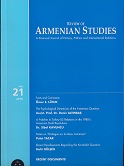The most significant development in Turkey-Armenia relations today is, without doubt, the two protocols signed between the two countries on 10 October 2009. The first protocol concerns the establishment of diplomatic relations and the second is on determining areas of cooperation and establishing an organization for this purpose. The entire “Facts and Comments” being the first article of our Journal, has been dedicated to the developments related to the protocols, starting with their signature to the suspension of their ratification by Armenia.
Armenians who have spread to many countries during and after the First World War, have started to be assimilate over time and the protection of their identity become their main problem. Within this framework, inspired by the Jewish Holocaust, the Armenians have alleged that they have been subjected to a genocide which, resulted to hostile feelings to emerge against Turkey and Turks, especially among the Diaspora Armenians. These feelings have caused an “Armenian Terror” to develop, especially in 1970 and 1980, aiming to murder Turkish diplomats for the sake of the “Armenian Cause”. Despite historical and political law aspects of the Armenian Question being well known, the psychological dimension of this question which is necessary to understand the behavior of especially the Diaspora Armenians has not been thoroughly researched. In the article entitled “The Psychological Dimension of the Armenian Question”, Assist. Prof. Deniz Altınbaş has examined issues such as the past traumas and psychological situations of all the parties: Armenians of Armenia, Armenian Diaspora, Turkish Armenians, Turks who defend the Turkish “official view” and Turks who apologize from the Armenians claiming that they feel guilty.
The Armenian Community in the US works towards resolutions to be adopted in the US House of Representatives and the Senate for being an important step of the international recognition of the Armenian genocide allegations. However, as a result of Turkey strictly opposing to such a resolution and the American governments, although with some reservations, supporting Turkey, adoption of such a resolution has not yet taken place up to now despite numerous attempts. In the article entitled “A Problem in Turkey-US Relations in the 1980’s: Armenian Draft Resolutions”, Dr. Sibel Kavuncu has examined the developments taking place in 1980 in this issue.
An interview conducted with Prof. Ahmet İnsel and author Michel Marian was published as a book in France entitled “Dialogue sur le tabou arménien” (Dialogues on the Armenian Taboo). Ambassador (Rtd.) Pulat Tacar has studied the main views expressed in this book along with his own comments in an article entitled “Notes on Dialogue Sur Le Tabou Armenian”. This article also sheds light on which conditions are required for an event to be considered genocide according to the UN 1948 Genocide Convention.
Efforts to find a settlement for the Karabakh conflict have continued for approximately fifteen years. The existing differences in views between Azerbaijan and Armenia, mainly on what the status of Karabakh will be in the future, have prevented a resolution to be reached on this conflict so far. However, the Minsk Group, under the co-chairmanship of the three major powers (US, Russia and France), is constantly striving to reach a settlement. In his article entitled “Recent Developments Regarding the Karabakh Question”, Halit Gülşen has addressed the developments in the settlement of the Karabakh conflict from 2006 until today.
Sincerely
The Editor


